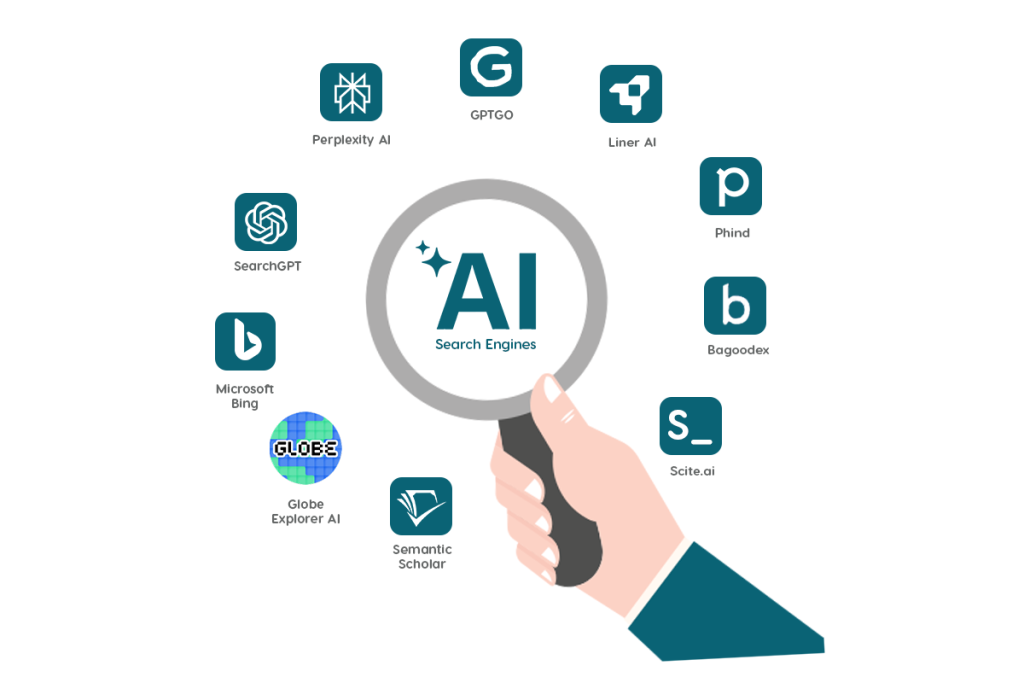AI search engines are reshaping how we access and understand information. These tools go beyond traditional keyword matchin; they use natural language processing (NLP), machine learning, and large language models (LLMs) to understand queries and deliver intelligent, contextual answers. Whether you’re researching for work, coding, writing, or just curious, here are the 10 best AI search engines you should know in 2025.
Looking to boost your creativity and productivity with modern technology? Check out these 10 Best AI Tools for Designers that can transform the way you work!
The Ultimate Guide to the 10 Best AI Search Engines of 2025
| 1 | Perplexity AI | General knowledge, research | Real-time, cited answers |
| 2 | Globe Explorer AI | Data visualization & global insights | Interactive maps, world data trends |
| 3 | Microsoft Bing | Everyday web search + AI assistant | Copilot with ChatGPT built-in |
| 4 | SearchGPT | Conversational search | GPT-powered interface for web browsing |
| 5 | GPTGO | Fast casual AI search | Lightweight GPT interface with instant replies |
| 6 | Liner AI | Reading, summarizing web pages | AI highlighting and summarization |
| 7 | Phind | Developers and programmers | Coding help, tech documentation via AI |
| 8 | Bagoodex | Niche/experimental AI search | Creative interface, emerging search logic |
| 9 | Scite.ai | Academic research | Citation-backed scientific claims |
| 10 | Semantic Scholar | Scholarly articles | AI paper filtering, citation graph |
10 AI Search Engines Revolutionizing the Way We Find Information
Explore the future of web searches with these 10 revolutionary AI search engines. Stay ahead of the curve in online research and information retrieval.

Perplexity AI
Perplexity AI is a conversational AI search engine that delivers precise, cited answers to virtually any question. It combines the strengths of ChatGPT with real-time web access, allowing users to explore topics through follow-up questions and trusted sources. Ideal for students, researchers, and casual users alike, Perplexity AI ensures that information is not only quick to access but also credible and easy to verify.
- What it is: A conversational AI search engine that gives real-time answers with proper source citations.
- Best For: Quick factual research, academic support, and everyday queries.
- Why Use It: You get reliable, referenced answers and can follow up your questions in a chat-like format.
Globe Explorer AI
Globe Explorer AI specializes in presenting global data through interactive maps and visual insights. It helps users explore statistics across domains like economics, environment, demographics, and global development. Designed for analysts, researchers, and educators, it brings raw datasets to life, making complex global patterns easier to understand through intuitive, geographic exploration.
- What it is: A visual AI engine for exploring global data—ideal for demographics, economics, climate, etc.
- Best For: Researchers, journalists, and data analysts.
- Why Use It: You can literally see trends on interactive maps and charts.
🔗 Explore Globe Explorer AI (if available)
Microsoft Bing with Copilot
Microsoft Bing with Copilot is a reimagined search engine that integrates GPT-4 into traditional web search. Users get AI-generated summaries, contextual information, and even creative tools like image generation built right into their searches. Its seamless integration with Microsoft products and its ability to blend AI responses with web content make it a powerful, everyday assistant for browsing and productivity.
- What it is: Bing now integrates OpenAI’s ChatGPT directly in search. It acts like a research assistant.
- Best For: General browsing, creative writing, quick AI tasks.
- Why Use It: Copilot mode gives conversational answers, citations, and can generate content like code, emails, etc.
Searching for the best web development tools? Let’s find the top 8 tools to optimize your workflow and enhance productivity.
SearchGPT
SearchGPT is an advanced AI-powered search tool that enhances the traditional search engine experience. Unlike typical search engines, it uses ChatGPT-like AI to interact with users, delivering results through conversational AI while also integrating real-time web data. This allows for a more interactive and intuitive web research process. It is ideal for those who want a blend of conversational AI and live search results. If you need more nuanced and interactive web research, SearchGPT could be the perfect tool for youSearchGPT stands out by combining the reasoning capabilities of GPT-style AI with the ability to fetch real-time data from the web. This makes it a powerful tool for conversational web research, where users can ask more complex questions and receive responses based on the most up-to-date information
- What it is: An AI-powered search that talks to you like ChatGPT but fetches web data too.
- Best For: Conversational web research.
- Why Use It: It blends GPT-style reasoning with live search results.
GPTGO
GPTGO is a minimalist, super-fast search engine powered by GPT. It integrates the power of ChatGPT with the traditional search engine experience but with a more focused and streamlined interface. It’s designed for those who need quick answers without the distractions of typical search results. Casual users looking for quick, accurate answers in a clean and fast format. It’s a great option for anyone who prefers simple, concise results without the clutter of traditional search engines.GPTGO offers the speed and simplicity of Google, but with the added conversational and reasoning capabilities of GPT. It’s perfect for anyone who needs fast information in an easy-to-digest manner, making it a great tool for quick queries and everyday use.
- What it is: A simple and super-fast GPT-powered search engine.
- Best For: Casual users looking for a quick answer without distractions.
- Why Use It: It’s like ChatGPT + Google—but minimal and snappy.
Liner AI
Liner AI is an AI-powered tool designed to help users summarize, highlight, and organize web content as they browse. It focuses on helping you extract key points from long articles and websites, which is particularly useful for research or studying.his tool is excellent for students, professionals, and anyone who consumes large amounts of written content. Whether you’re doing research or just reading articles, Liner AI helps you stay focused by pinpointing what’s most relevant.Liner AI enhances your browsing experience by automatically highlighting the most important parts of any article, helping you quickly skim and find the relevant information. It’s particularly helpful for staying organized and improving efficiency while reading or researching online.
- What it is: AI that helps you summarize, highlight, and organize web content as you browse.
- Best For: Students, professionals, and readers.
- Why Use It: Instantly highlights key points in any article and helps you stay focused on what matters.
Phind: Best AI Search Engine
Phind is an AI-powered search engine designed specifically for coders. It’s a specialized search engine that helps developers and tech learners by answering programming questions, explaining code snippets, and pulling in related documentation. It’s like an AI-powered assistant for software development.Developers, tech learners, or anyone involved in programming and software development. If you’re looking to solve coding problems or better understand technical concepts, Phind is tailored to meet those needs. Phind’s main appeal is its ability to quickly provide coding solutions, explanations, and documentation, making it a cleaner and more efficient alternative to platforms like Stack Overflow. It integrates helpful coding resources and AI insights into one platform, making it a must-have tool for anyone in tech.
- What it is: AI search built for coders. It answers programming questions, explains code, and pulls in documentation.
- Best For: Developers and tech learners.
- Why Use It: Cleaner than Stack Overflow + AI coding assistant in one.
Bagoodex
Bagoodex is an experimental or lesser-known AI search engine that offers an alternative approach to traditional search engines. It uses unique algorithms to bring creative and obscure content to the forefront, allowing you to discover information you might not find through more conventional search tools. If you’re interested in exploring new search experiences and uncovering lesser-known or niche content, Bagoodex could be an intriguing option. It’s great for those who like experimenting with new search logic and discovering more creative or obscure content. Bagoodex may surprise users with its unconventional approach to search. By using different algorithms and search logic, it can surface content that more mainstream search engines might miss, providing an opportunity for discovery and exploration in unconventional ways.
- What it is: A lesser-known or experimental AI search engine.
- Best For: Trying out new search experiences.
- Why Use It: You might discover creative or more obscure content through its alternative search logic.
Scite.ai
Scite.ai is a research tool designed to help users verify scientific claims by showing how those claims have been cited in other research. It goes beyond traditional citation searching by analyzing whether the citation supports, contradicts, or is neutral to the claim being made. Academics, scholars, and researchers who need to evaluate the credibility and context of scientific papers. It’s particularly helpful for anyone conducting in-depth research and needing to assess the quality of citations in academic works.Scite.ai is a powerful tool for verifying scientific claims and understanding how research findings are used in the broader academic community. By providing context for citations (supportive, contrasting, or neutral), it helps researchers navigate complex academic literature more effectively and accurately.
- What it is: AI that helps you verify scientific claims by showing how they are cited in other research.
- Best For: Scholars, scientists, and critical thinkers.
- Why Use It: It distinguishes between supportive, contrasting, and neutral citations.
Semantic Scholar
Semantic Scholar is an academic search engine that uses AI to surface important research papers and insights in specific academic fields. It provides advanced features like citation analysis, influence scores, and citation trails to help users find the most relevant research. It’s perfect for academics, PhD students, and researchers who need to find high-quality, relevant academic papers. If you’re conducting detailed scholarly research, Semantic Scholar is an essential tool for finding key literature.Semantic Scholar uses AI to highlight the most impactful and relevant papers in your field, providing tools to analyze citations, influence, and research networks. Its AI-driven features help you quickly sift through massive amounts of academic content and find what’s most important for your research.
- What it is: An academic search engine that uses AI to surface important papers and insights.
- Best For: Academics, PhD students, researchers.
- Why Use It: Its AI shows you the most relevant research, influence scores, and citation trails.
Are you looking for the AI image generator tools? Let’s find the best AI tools of the modern era.
Conclusion
AI search engines are reshaping the way we access and interact with information by blending traditional search functionalities with advanced AI capabilities. These tools provide more accurate, context-aware, and personalized results, whether it’s for academic research, coding help, or general inquiries. By utilizing natural language processing and machine learning, AI search engines like Perplexity AI, Phind, and Semantic Scholar offer users smarter, faster, and more efficient ways to gather relevant data, making them essential for a wide range of tasks from casual queries to in-depth professional research. As technology continues to evolve, these tools will only become more powerful and indispensable in how we navigate the digital landscape.


